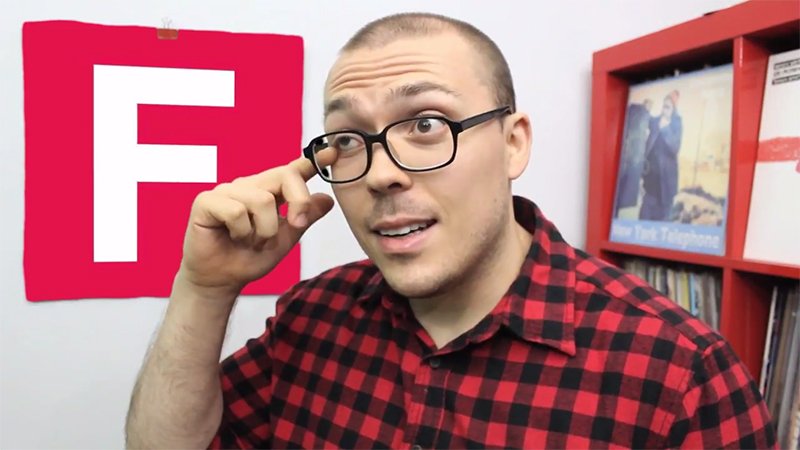Music critic and YouTube personality Anthony Fantano had a tour canceled last fall because of his alleged ties to the alt-right, but that didn’t stop him from coming to Conn. Originally presented in an article by Fader, the connection between Fantano and the alt-right might seem like a stretch in some regards, but much of Fantano’s content remains controversial and offensive to students.
“Personally, I was quite satisfied with [Fantano’s] response [to the Fader piece],” said Charlie King ’18, the student general manager at WCNI who invited Fantano to campus. “I don’t believe anyone is above reproach and criticism but I thought he clearly addressed a lot of the major questions.”
The Fader piece deconstructs some of the videos Fantano posted on his second channel, thatistheplan, and condemns his relationship with two different social commentators with alleged ties to the alt-right, Sargon of Akkad and Sam Hyde.
Due to the criticism that spread from the Fader piece, a student of color on campus allegedly felt unsafe and unwelcome to Fantano’s recent event. This was a cause for concern to Moll Brown ’18 and Fiona Noyes ’20. Brown, who agrees that the Fader piece “manipulates material to reinforce their specific perspective,” decided to do their own research to uncover Fantano’s political views. They created a 31-page document analyzing the videos that Fantano had linked with his response video, which he claimed were not offensive. Their document included screenshots from these videos, where they found some concerning background images. At one point, in a video titled, “Hopsin is the Greatest Rapper,” a sudden stream of images goes by so quickly that one has to pause to view them frame-by-frame. Among the images, most of which were random internet memes, was a picture of Hitler.
Though King was aware of the Fader piece and the controversy surrounding Fantano, he chose to invite the critic to Conn because of his roots in student radio. Fantano began as a music director at Southern Connecticut State University and is now a successful online music critic. He posts his music reviews on his YouTube channel, The Needle Drop, which he prioritizes over the controversial and now-deleted channel thatistheplan.
Brown, Noyes, and a few other students began to protest the event and were able to voice their concerns the night before the event at a last minute open forum. Conn has no formal policy for vetting speakers before or after inviting them to campus, so the open forum sought instead to develop critical questions with which to confront Fantano after his talk. At the open forum, King condemned Fatano’s now defunct channel thatistheplan as “poor taste” comedy, with Brown responding that it is easy for someone with privilege to brush offensive content off as “poor taste” when it does not affect them. Those defending Fantano and WCNI’s decision saw the conversation as an opportunity to launch a larger critique of the ways self-identified liberals wear their political affiliation as a shield against valid criticism of offensive content.
As for the actual event, Fantano began with an hour-long presentation about his own journey as a professional music critic. Those protesting his visit did not attend the first part of Fantano’s presentation, but joined the room later for a question and answer session. Noyes began the session by asking Fantano bluntly if he was any way tied to the alt-right. Some in attendance groaned, but Fantano was open to answering her question, claiming that his channel thatistheplan was a site for creative satire, a home for the gross realities of the world and the internet and a place to use dark humor to reflect on them. Giving Noyes a bit of pushback, he asked her if she had ever laughed at seemingly messed up things.
Fantano then chastised those in the audience who groaned at Noyes’s question, recognizing that it is important to have these conversations and to be respectful.
Cara Fried ’20 then brought up Fantano’s relationship with Sargon of Akkad, asking why he would give him a platform through interviewing him in a podcast. Fantano claimed that he did not know the extent of his views and wanted to gain a perspective on this interesting “cultural battle.” He stated that he would have pushed back on Sargon of Akkad’s views more if he did not expect his audience to be able to understand and judge for themselves what was problematic or not, but apologized for the fact that he simply did not have the background or information to accurately confront Sargon of Akkad’s harmful views.
King says he felt that the event was not giving Fantano a platform to express his political views, “but instead saw it more as an opportunity for critique because he wasn’t there voicing his politics, he was there to talk about his experience as an outsider in the music industry and his independent success. […] It’s a lot easier to dismiss concerns when they’re vocalized in 140 characters on Twitter than when they are given in an articulate question and when the person who is questioning you is face to face instead of through the internet.” Brown commented that they did not care “if he’s not here to talk about offensive content, but that is what he represents. [By inviting him,] we are supporting someone who is putting out really dangerous and violent politics.”
“This isn’t an uncommon phenomenon,” said King, “to have an established publication sort of attack someone who is in new media and sort of drag them through the dirt.” Campus conversation around the Fantano affair altogether broaches the question of skepticism in consuming media, not just from the person in question but also from those who are criticizing or calling out another person.










